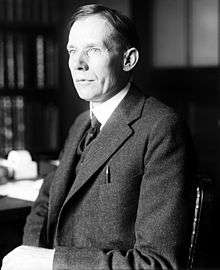Zebulon Weaver

Zebulon Weaver (May 12, 1872 – October 29, 1948) was a Democratic U.S. Congressman from North Carolina between 1917 and 1929 and between 1931 and 1947.
Early years and education
Born in Weaverville, North Carolina, Weaver attended public schools, Weaver College, and then the University of North Carolina at Chapel Hill, where he studied law. He was admitted to the bar in 1894 and practiced law in Asheville, North Carolina.
Political career
Weaver was elected to the North Carolina House of Representatives in 1906 and 1908 before being elected to the North Carolina Senate in 1912, serving a single term. He was elected to the U.S. House from North Carolina's 10th congressional district in 1916 and served for almost two years. His election was successfully contested by James J. Britt, who was seated for the last four days (between March 1, 1919 and March 3, 1919) of the 65th United States Congress.[1]
Weaver was then elected to four more Congresses until he was defeated for re-election in 1928 by Republican George M. Pritchard. He recaptured his seat in 1930 and served eight more terms in Congress (March 4, 1931 – January 3, 1947) until losing a battle for the renomination in 1946. He returned to practicing law in Asheville until his death in 1948.[1] During his tenure in office, Weaver was responsible for the bill that resulted in the creation of the Great Smoky Mountains National Park.[2]
Gertrude Dills McKee, later to become the first female member of the North Carolina State Senate, supported his reelection efforts in 1928; it was her first experience in politics. [3]
Personal life
Weaver was a member of the Knights of Pythias.
References
- 1 2 "Will the real congressman stand up". The Times-News. November 15, 1982. Retrieved April 16, 2010.
- ↑ "The Great Smoky Park". Spartanburg Herald-Journal. November 7, 1948. Retrieved April 16, 2010.
- ↑ "Gertrude Dills Mckee". Stopping Points Historical Markers & Points of Interest. Retrieved 9 September 2015.
External links
- United States Congress. "Zebulon Weaver (id: W000230)". Biographical Directory of the United States Congress.
- NC Manual of 1913
- Zebulon Weaver at Find a Grave
| United States House of Representatives | ||
|---|---|---|
| Preceded by James J. Britt |
Member of the U.S. House of Representatives from North Carolina's 10th congressional district 1917–1919 |
Succeeded by James J. Britt |
| Preceded by James J. Britt |
Member of the U.S. House of Representatives from North Carolina's 10th congressional district 1919–1929 |
Succeeded by George M. Pritchard |
| Preceded by George M. Pritchard |
Member of the U.S. House of Representatives from North Carolina's 10th congressional district 1931–1933 |
Succeeded by Alfred L. Bulwinkle |
| Preceded by none (new district) |
Member of the U.S. House of Representatives from North Carolina's 11th congressional district 1933–1943 |
Succeeded by Alfred L. Bulwinkle |
| Preceded by none (new district) |
Member of the U.S. House of Representatives from North Carolina's 12th congressional district 1943–1947 |
Succeeded by Monroe M. Redden |